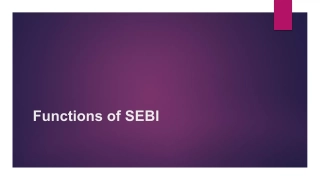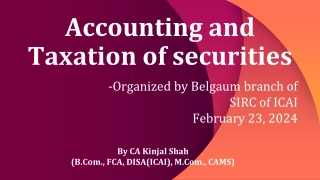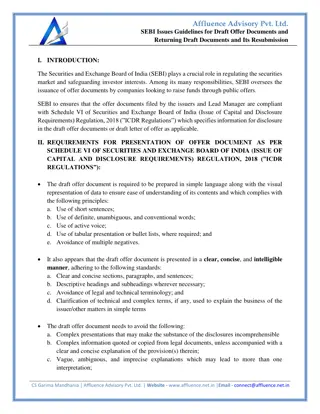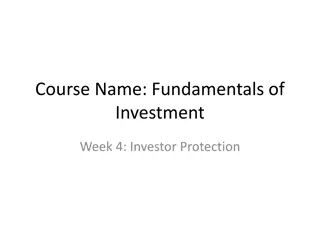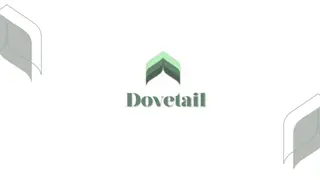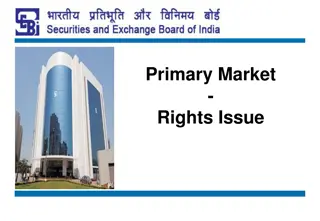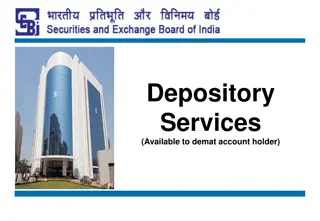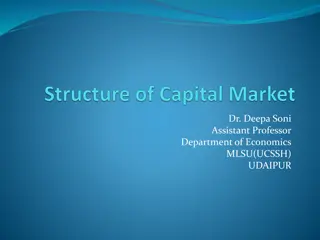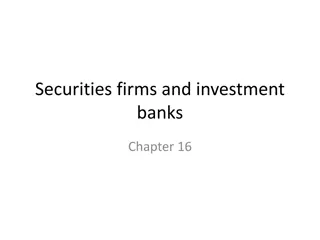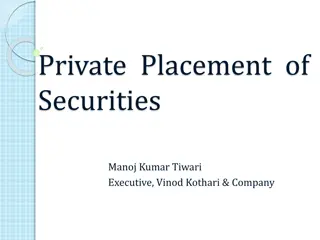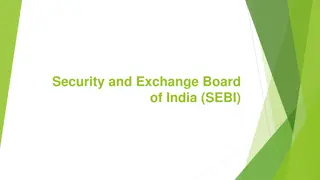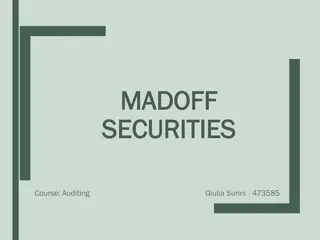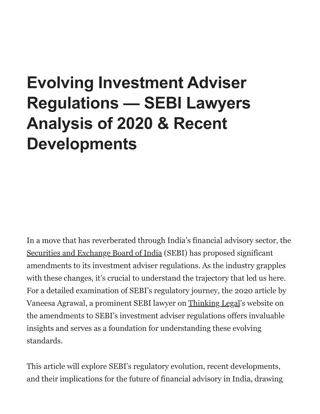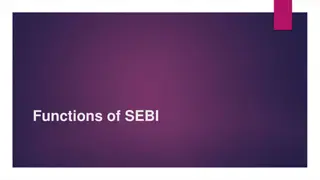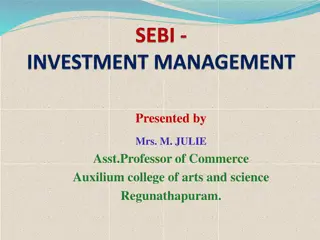Overview of Indian Securities Market and SEBI
Explore the Indian Securities Market and the role of SEBI in regulating it. Learn about key concepts such as primary and secondary markets, investor rights, mutual funds, and investor grievance redressal. Understand the structure of the market and the prerequisites for buying and selling shares. Discover SEBI's mandates, major works, and its efforts towards protecting investor interests, improving market regulation, and promoting market development and transparency.
Download Presentation

Please find below an Image/Link to download the presentation.
The content on the website is provided AS IS for your information and personal use only. It may not be sold, licensed, or shared on other websites without obtaining consent from the author. Download presentation by click this link. If you encounter any issues during the download, it is possible that the publisher has removed the file from their server.
E N D
Presentation Transcript
INDIAN SECURITIES MARKET
Disclaimer Disclaimer Information contained in this presentation is as on September 30, 2022. The information contained in this presentation is only for Educational and Awareness Purposes related to securities market . This presentation is only for Educational and Investor Awareness Programs and shall not be used for any legal interpretations. SEBI or Stock Exchanges or Depositories shall not be responsible for any damage or loss to any one of any manner from use of this material. Suggestions or feedbacks, if any, may please be sent by mail to visitsebi@sebi.gov.in. 2
SEBI 3
FLOW OF PRESENTATION Introduction to SEBI and Indian Securities Market (MIIs, Companies and Investors). Introduction to Primary Market and Secondary Market. Pre-requisite and Due Diligence for buying/ selling shares in Securities Market. Rights of a Shareholder. Introduction to Mutual Funds. Do s and Dont s of buying/ selling shares in securities market. Investor Grievance Redressal SCORES. Information/ Help Desk of SEBI. 4
Securities and Exchange Board of India (SEBI) Three Key Mandates of SEBI Major Work done by SEBI Protection of interests of investors Improvement in Market design and regulation Promote development of Securities Market Increase in market efficiency and transparency Regulation of securities market Availability of newer products 5
Indian Securities Market Structure SEBI - Regulator Clearing Corporations Stock Exchanges Depositories Companies Other Intermediaries (Merchant Bankers, RTAs, etc.) Depository Participants (DPs) Brokers 6
Pre-requisites for buying/ selling shares in Securities market Savings Bank Account - Savings Account can be in any bank - Transfer/ receipt of funds from buying/ selling of securities Accounts needed to trade in securities market DematAccount - With a SEBI registered Depository Participant (DP) - To hold shares in Demat (electronic) mode Trading Account - With SEBI registered Stock Broker( Trading Member/ TM) - To buy/ sell securities 7
Pre-requisite for buying/ selling shares in Securities Market Trading and Demat Account Basic Requirements Proof of Identity Proof of Address Passport/ Driving License/ Voter Identity card/ Aadhar Card / MGNREGA Job Card & Proof of Identity/ any other govt. approved Proof of Address PAN Bank account Opening of Accounts Demat Account Trading Account *AADHAR Card is not a compulsory document. 8
Primary Market v/s Secondary Market Features Primary Market Secondary Market - Securities issued first time to the public. - Trading of already issued and listed securities. Definition - New Issue Market. - Post Issue Market. Also called as - By consultation with Merchant Bankers. Merchant Bankers and RTAs - Issuer Company in - Supply and Demand Forces of Market. Price Determination - Stock Brokers and DPs. Key Intermediaries Purpose - Raise capital for expansion, diversification, etc. - - - Trading of securities. Providing liquidity to investors. Raising further expansion. capital for 9
Primary Market - Types of Public issues Issues Private Placements Public Issues Rights Issues Bonus Issues Qualified Institutional Placement Preferential Issue IPO FPO Fresh Issues Offer for sale Fresh Issues Offer for sale 10
Investing - Due Diligence Why Due Diligence? Investment without analysis is like driving on a highway blindfolded. Pro active approach enabling investors to know about prospective investment. Better understanding about the past performance. Greater possibility of securing future growth of the investment. What questions to ask before investing? Is the company s revenue increasing? Is the company actually making a profit? Is the company able to repay its debts? Is the company in a position strong enough to compete with its peers? 11
How to apply in Public Issue? - - - Application Supported by Blocked Amount. Facility provided by Self Certified Syndicate Banks (SCSCBs) Full Bid Amount blocked in the bank account of the bidder. ASBA - For a) Retail Individual Investors. b) Bidding for retail investors reserved up to Rs.5,00,000/-. UPI in ASBA - - Application via UPI facility of Sponsor Bank. Applying in IPO through 3-in-1 account (demat, trading and bank account). 3-in-1 Account OFFLINE MODE and ONLINE MODE - - To open a Demat Account first. Investors may obtain Application Form from Stock Broker/ Sponsor Bank/ Exchange Website. Form submitted to Stock Broker/ Sponsor Bank. Filled Form - 12
Rights of a Shareholder Part-owner of the company. Right to receive corporate benefits like dividend, whenever declared. Right to receive: - Annual Reports - Audited Financial Statements - Notices of General Meetings and other notices - Other information disseminated by company. Right to attend company meetings. Right to contribute in key corporate governance decisions through postal ballot/ e-voting. 13
Rights of a Shareholder (subject to certain limitations/ restrictions) Right to: - - - Ask questions to the board of directors. Place items on the agenda of general meetings. Propose resolutions, etc. Right to participate in matters needing shareholder approval like: - To vote in company proceedings. - To approve mergers & acquisitions, appointment of directors on company board, changing auditors, etc. Right to Inspect company s statutory books and records. Right to Transfer shares by applicable laws. To raise grievances, if any, against the company (using SCORES, etc.). 14
SEBIs recent Investor Protection measures E-KYC Power of Attorney (PoA) Pledge/ Re-pledge framework - Online KYC Process - Aadhaar authentication - e-Sign signature framework - Not a compulsory document - Only required for availing internet trading facility - Acceptance of securities by way of pledge by client DDPI (Demand Deposit and Pledge Instruction) Basic Services Demat Account (BSDA) Mutual Funds - To transfer securities held in client toward stock exchange for settlement obligation - To pledge/re-pledge securities - Product labelling on basis of risk associated with the scheme. - Demat account at reduced costs - For Retail Investors 15
Why Mutual Fund? Diversification Professional Management Convenience WHY? Tax Return Potential Advantages Flexibility & Liquidity 17
Major Development and Investor Protection Measures of SEBI Mutual Funds a) Classification of mutual funds into 5 schemes: Equity Schemes Debt Schemes Hybrid Schemes Solution Oriented Schemes Other Schemes. b) Product labelling of Mutual Funds as under: Low - principal at low risk Low to Moderate - principal at moderately low risk Moderate - principal at moderate risk Moderately High - principal at moderately high risk High - principal at high risk Very High- Principal at very high risk. 18
Investor Charter InvestorCharter for securities markets o SEBI (Published in November 2021) o Stock Exchange and Depository o Other intermediaries viz. Stock Brokers, Merchant Bankers, etc. Objective of InvestorCharter o To promote transparency in markets o To enhance awareness o To enhance trust and confidence among the investors Key Elements of the Investor Charter: Services which can be availed by investor Timelines for completion of services Do s and Don ts for investors o o o Rights and Responsibilities of investors o Grievance Redressal mechanism o Published on SEBI website and websites of MIIs/ Intermediaries. 19
Investor Charter of Intermediaries Investor Charters of SEBI registered Intermediaries and Market Intermediaries Institutions viz Exchanges and Depositiries: Investor Charter Stock Exchange Investor Charter Stock Broker Investor Charter Depositories & Depository Participants (DPs) Investor Charter Mutual Fund Investor Charter Merchant Bankers Investor Charter Registrar and Share Transfer Agents Investor Charter Investment Advisers (IAs) Investor Charter of other intermediaries are displayed on SEBI s Investor website and website of respective institutions. 20
Dos and Donts of buying/ selling shares in securities market Make sure to receive funds/ securities in your account within one (1) day of pay- out date. Please read and understand Power of Attorney (PoA) before executing it. Please remember that PoA is not a mandatory document. Ensure to receive Contract Notes within 24 hours of your trades. Ensure to receive statement of account at least once a quarter from your stock broker. Avoid keeping excess money in broking account. 21
Dos and Donts of buying/ selling shares in securities market Ensure that Stock Broker doesn t pledge your securities to raise funds. Don t keep signed delivery instruction slip with DP/ stock broker. Regularly verify balances of securities in your demat account. To receive Email / SMS Alerts : Please ensure that your email id and mobile number are updated periodically with the stock broker/ DP. Don t trust any investments. hot investment tips promising unrealistic returns on 22
Dos and Donts of buying/ selling shares in securities market Don't blindly imitate investment decisions of others who may have profited from their investment decisions. Get clear about all brokerage, commissions, fees, other charges levied by broker. Make payments by banking channel/cheque only in favour of stock broker. Don t share your internet trading account password with anyone. Don't blindly follow advertisements/ media reports about the financial performance of companies, as they may be misleading. 23
Advice to Investors Be aware of your Rights and Responsibilities. Read SEBI s Investor charter which contains rights and responsibilities of investors Read Investor Charter of Registered Intermediaries. It is available on their respective website Take informed decision and do proper due diligence while investing. No impulsive buying or panic selling. Deal only with SEBI registered Intermediaries. Caution against unsolicited investment tips. 24
Investor Grievance Redressal - SCORES Complaints can be filed against entities like: Listed companies; Stock Brokers; Stock Exchanges; Depository / Depository Participants; Registrars to an Issue / Share Transfer Agent; Mutual Funds / Portfolio Managers; Bankers to an Issue; Collective Investment Schemes; Credit Rating Agencies; Custodians of Securities; Debenture Trustees; Merchant Bankers / Underwriters. www.scores.gov.in : SEBI COmplaints Redressal System (SCORES) launched on 08.06.2011. Investor friendly, Centralized Web based complaints redress system. Online filing of complaints and status can be viewed online. SCORES Mobile App: available on both iOS and Android platforms. 25
Information/ Help Desk of SEBI SEBI Investor Website: http://investor.sebi.gov.in SEBI Toll-Free Help Line No's: 1800 22 7575 & 1800 266 7575 (Monday to Friday - 9:30 a.m. to 5:30 p.m.). ASK SEBI: asksebi@sebi.gov.in (email ID for Investor Assistance for general queries) Details of SEBI offices in various cities/ towns can be found on the address: https://www.sebi.gov.in/. 26
How to Buy/ Sell Shares in Securities Market? 27
FLOW OF PRESENTATION Trading & Demat Account Opening Form Documents in Account Opening Form - Trading & Demat Account Modes of Placing Orders to trade Contract Note How to settle buy and sell trade? Payment of Margins Early Pay-in Grievance Redressal 28
Trading & Demat Account Opening Form Documents to open Trading and Demat account: Proof of Identity (Any one) Permanent account number (PAN) card (Mandatory) Voter ID card Driving License Passport Aadhaar Card Any other valid identity card issued by the Central or State government Proof of Address (Any one) Voter ID card Driving License Passport Ration Card Aadhaar Card Bank account statement or bank passbook Utility bills e.g. electricity bill or gas bill Documents collected in terms of KYC (Know Your client) Requirements. KYC is a one-time process and is valid across all the stock brokers and DPs. 29
Documents in Account Opening Forms - Trading & Demat Account Account Opening Form has two type of documents : MANDATORY DOCUMENTS VOLUNTARY DOCUMENTS** Rights & Obligations of Stock Broker and Investor. Running Account Authorization. Power of Attorney (PoA). Uniform Risk Disclosure Documents. Demand Instruction (DDPI). Debit and Pledge Do s and Don ts for trading on Exchanges. Electronic Contract Note (ECN) Declaration. Policies and Procedures of Stock Broker. Consent communication and receiving alerts (Email/ SMS). for electronic Tariff Sheet. **(to be submitted only if investor is availing of additional services) 30
Nomination for Trading/Demat/Mutual Fund Units Investor to get two options regarding nomination To provide nomination in the prescribed form up to three person along with their percentage Opting out of nomination through prescribed declaration form Folios/Account to be freezed if none is opted till March 31, 2023 Applicable for opening new Demat account and trading accounts on or after October 01, 2021 Applicable for investor subscribing to mutual fund units on or after October 01, 2022. For existing unit holder, AMC shall provide an option to submit In case of physical option, the form shall carry the wet signature In case of online option, AMC shall validate the form using e-Sign Or through two factor authentication (2FA)
Power of Attorney (PoA) Power of Attorney (PoA) is Optional and should not be insisted upon for opening of the client account. PoA executed in favour of a Stock Broker by the client should limited to the following: Transfer of fund of client for settlement obligation Enable stock broker and depository participants to operate bank account to meet settlement obligations A valid PoA must be 'franked' (i.e stamped). This is applicable with effect from September 18, 2022. 31
Demat, Debit and Pledge Instruction(DDPI) To safeguard the interests of investors, a new document called - Demat, Debit and Pledge Instruction (DDPI). DDPI limited for following purposes only: To transfer securities held in your account towards stock exchange related deliveries or settlement obligations To pledge/re-pledge securities Mutual fund transactions being executed on stock exchange order entry platforms (shall be in compliance with SEBI circulars) Tendering shares in open offers (shall be in compliance with SEBI circulars) Came into effect from November 18, 2022 32
Modes of Placing Orders to trade Visit to Broker s Office By using Stock Broker s Mobile App Trade via Phone Call Modes of placing orders to Trade By using Stock Broker s website Through an email to Stock Broker While placing order to trade you receive SMS/ Email alerts on your registered mobile number and email account. 33
Contract Note What is a Contract note? Record of any transaction. Confirmation of trade done. In case of discrepancy, contact your broker immediately. What does a Contract Note contain? Details of transaction. Date, Time, Price, Quantity, Trade ID, various charges/ levies, etc. How to receive a Contract Note? Within 24 hours from the date of trade execution. Electronic Contract Note sent to registered email ID. Can opt for Physical Contract Note. Quarterly statement of funds and securities. 34
How to settle buy and sell trade? Pay-in of funds and /securities: Pay-in of funds/ securities: Transfer of funds/ securities from broker s account to exchange s account. Funds / Securities: Cash Segment - On or before T+2 T+1 settlement cycle is introduced for the scripts included in the list in phase manner since February 25, 2022. Complete list of stock is available on stock exchange website. Derivatives Segment - On or Before T+1 Only Cheque/ NEFT/ RTGS to the Stock broker only. Pay out of Funds and securities: Pay-Out of funds/ securities: Transfer of funds/ securities from broker s account to client s account once trade of securities has been executed. Funds / Shares to be received in Investor s Demat Account within 24 hours of pay-out day. Counter Party Guarantee: Given by Stock Exchange for settlement of every buy/ sell trade, through Settlement Guarantee Fund (SGF). CASH DEALING IS STRICTLY PROHIBITED 35
Payment of Margins Margin to be placed with broker before placing orders. Money or Securities or both Check Margin requirement on the website of Stock Exchange. Margin paid in securities form : By way pledge instead of transfer of shares in broker s demat account. Margin payments Authenticated by One Time Password (OTP). 36
How to pay margin in Securities Margin Pledge Effective from September 01, 2020. Investors can pay margin in form of Securities , if : - Securities are pledged in favour of Stock Broker. What s New?: o Stock Brokers can accept securities (viz. shares) as collateral only in form of margin pledge created on the securities held in client s demat account. 37
Margin Pledge What does the Investor need to do?: o Give instruction to create margin pledge on securities. o Instruction may be given in: - Physical form - Electronically through SPEED-e (for NSDL) and Easi/Easiest (for CDSL). Pledged to whom? o Created in favor of a speciallydesignated demat account of the stock broker/ clearing member. o Name of the account : TM Client Securities Margin Pledge Account or TM / CM Client Securities Margin Pledge Account). 38
Early Pay-in Payment of funds/ delivery of shares (in case of buy/sell) to the Exchange by pay-in time on settlement date. Early Pay-in: When Investor pays funds / delivers shares before this designated time. Exemption: Upon early pay-in of Funds: No margin needs to be paid (subject to bank confirmation) Upon early pay-in of securities: No margin needs to be paid. Stock Brokers to provide early pay-in details to the Stock Exchange in a specified format. 39
Investor Grievance Redressal If investor has dispute with his Stock Broker: i. Immediately question the Stock Broker about any transaction that you do not understand or you did not authorize your trading member. ii. Investor should raise such complaint in writing to the trading member and retain copies of all related correspondence done with the trading member. iii. In case your complaint has not been addressed/ redressed by the trading member file complaint with Stock Exchange. iv. In case you don t receive any satisfactory response/ redressal of your grievance from Stock Exchange as well, you may file your complaint on SEBI SCORES. 40
Investor Grievance Redressal Complaints at Exchange can be filed by Investor via : i. Online portal of the Exchange ii. Email iii. Physical letter at any Investor Service Centre iv. Complaint can be filed by investor at the nearest Investor Service Centre (ISC) In case aggrieved by the resolution given by Stock Exchange Approach Investor Grievance Resolution Panel (IGRP). In case aggrieved by the resolution given by IGRP Take up the matter via Arbitration, a quasi judicial mechanism. 41
FLOW OF PRESENTATION Demat Account Basic Services Demat Account (BSDA) Services offered by Depositories Investor holding physical shares Transmission of Securities What is a Pledge? Margin Pledge Consolidated Account Statement Investor Grievance Redressal 43
Demat Account Depository Participant Agent of Depository. - Opens Demat Accounts for clients on behalf of Depository. Demat Account Number CDSL NSDL - Numeric Character - Numeric Code starting with IN - eg: IN01234567890987 - eg: 0123456789098765 **Demat Account Numbers are combinations of DP ID and Customer ID and are unique for every customer. 44
Basic Services Demat Account (BSDA) Facility for retail investors EQUITY SHARES DEBT SECURITIES Holding AMC Charges Holding AMC Charges <Rs.50,000 NIL <Rs.1,00,000 NIL Between Rs.50,000 Rs.2,00,000 Rs.100/- per year Between Rs.1,00,000 Rs.2,00,000 Rs.100/- per year >Rs.2,00,000 Charges as applicable to regular (non-BSDA) accounts >Rs.2,00,000 Charges as applicable to regular (non-BSDA) accounts Eg: Debt securities = Rs.90,000/- & Equity Shares = Rs.40,000/- NO AMC Charge. Eg: Equity shares = Rs.1 lakh & Value of those shares increases to Rs 2.5 lakhs Investor is not eligible for BSDA. 45
Services offered by Depositories Dematerialization (Demat): converting physical certificates to electronic form. Rematerialisation (Remat): Reverse of Demat, i.e. converting electronic securities into physical certificates. Transfer of securities Change of beneficial ownership 46
Services offered by Depositories Settlement of trades done on exchange connected to the Depository. Service can be availed through Depository Participant (DP) Many Stock Brokers and Banks function as DPs and investors can open a new demat account with them. Enabled e-voting by way of single login Through client demat accounts Through website of depository and depository participants Confirmatory SMS to the shareholders by depository Demat securities in depositories - Safe and Secure. 47
Investor Holding Physical Shares Investor holding physical securities to provide following to RTA Valid PAN Nomination/Declaration to opt-out Contact Details(Postal Address, email ID and Mobile number) Bank Account Details (Bank Name, Branch, Account Number, IFS Code) Specimen Signature The Folios shall be frozen if documents are not provided till April 01, 2023 Procedure for issuance of duplicate securities certificates If Value of securities is less than Rs. Five Lakhs Affidavit and indemnity bond If Value of securities is more than Rs. Five Lakhs Copy of FIR/e-FIR/Court Injunction etc. Affidavit and Indemnity bond Advertisement in newspaper regarding loss of securities 48
Transmission of Securities Transfer of securities balances in a demat account due to: Death, bankruptcy, lunacy, etc. of the account holder, To legal heir/ another holder. Not a voluntary act of the account holder. Transfer brought about by operation of law i.e. a person cannot ask for transmission of shares from his/her own Demat account. Transmission process Simple and Fast. 49

 undefined
undefined





